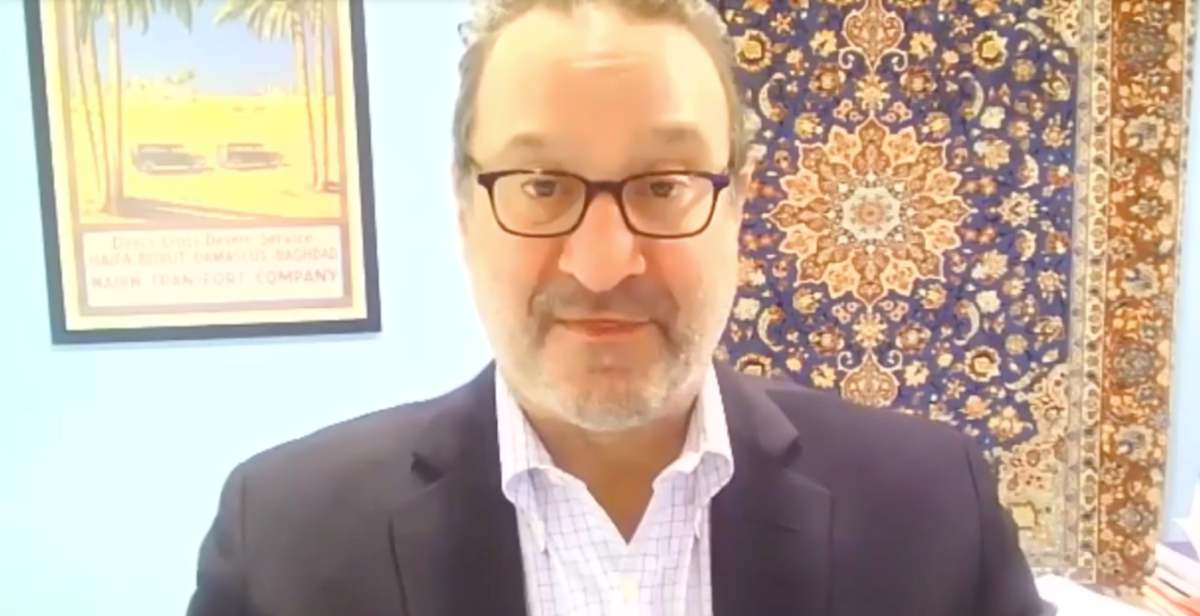Fmr US Diplomat: Biden Will Not Withdraw from Syria Before Elections
By Wladimir van Wilgenburg
On February 16, 2024, The Kurdish Center for Studies (KCS) organized a seminar on US policy towards the Middle East following the events of Oct. 7th and the war in Gaza, moderated by KSC fellow Shoresh Darwish. David Schenker, the Taube Senior Fellow at the Washington Institute and former US Assistant Secretary of State for Near Eastern Affairs, was hosted by the KCS as a distinguished speaker for the event.
Since the war in Gaza, Iran-backed groups have stepped up attacks on US troops in Iraq and Syria, carrying out around 180 attacks. Since Feb. 4 there have been no new attacks on US forces in Syria and Iraq.
Former Secretary Schenker said that both Iran and the US are not interested in a full war with each other. “We all know that Iran is willing to fight the United States and Israel to the last Arab,” he said. “They will use their proxies and they are cannon fodder for Iran. But it’s another thing if the United States, like Israel, starts going after the IRGC or targets within Iran.”
Moreover, he said that the US is aiming to pivot to Asia and prioritizes Ukraine. “There’s no desire to get into another war and as we’re talking with Iraq about pulling some troops out.” The US is currently also in talks with Baghdad to wind down the anti-ISIS coalition presence in Iraq. He added that one of the main values of US troops in Iraq is to provide logistical support to the mission of US troops in Syria and “enable our partnership to continue with the SDF (Syrian Democratic Forces).”
Biden Will Not Withdraw from Syria
Moreover, he stressed that “if the reports are true, that the Biden administration is considering a pullout from this deployment. Then there’s even less requirement in a way to have 2,500 troops in Iraq to help provide good logistics for these troops in Syria.”
Nonetheless, Schenker underlined that US President Joe Biden will not do anything before the US elections scheduled for November 5, 2024. “Because he (Biden) already had one disastrous withdrawal from Afghanistan (in 2021),” Schenker said. “He can’t be seen as leaving, and he certainly can’t be seen as leaving another regional country under fire.”
Additionally, Schenker added that he doesn’t believe the US will remain in Syria indefinitely, akin to its troop presence in South Korea, Japan, and Germany, also because the US was not invited to Syria by Damascus. “The difference between Syria and those other countries is that those other countries actually want us there.”
Furthermore, he expressed concerns regarding the US potentially withdrawing from Syria or Iraq.
“We will be seen as abandoning our SDF partners. We will be abandoning our role in overseeing along with the SDF, the al-Hol camp, and all these radicalized jihadists—50,000 of them, which the Assad regime would no doubt put on boats and send to Europe. You know, this is what President Bashar Assad does.”
Nevertheless, the former US Secretary said that the US can also “downsize our (military) presence in Iraq and still keep a residual presence in Iraq that allows us to do our work in Syria.”
Trump’s Isolationist Tendencies
But he added that if US President Donald Trump were to be re-elected, it remains uncertain whether he would maintain troops in Syria, given the isolationist tendencies within the Republican Party. These tendencies include ideas such as opposing NATO, seeking agreements with Russian leader Vladimir Putin, and withholding funding for Ukraine, he stated.
In 2019, US President Donald Trump also attempted to withdraw from Syria amidst a Turkish attack on the SDF. “You know that the Trump announcement of the pullout from Syria. This happened like two months before I came to work for (Mike) Pompeo and even when this announcement was made, the President eventually changed his mind to some degree.”
“We only withdrew 200 troops or 300 troops and we still had the vast majority 800 or 850 troops there. So that withdrawal never really happened, although a certain amount of territory was indeed ceded to the Turks.”
Former US Secretary Schenker also emphasized that the idea of the US abandoning the SDF and working with the Assad regime would be ‘silly’. Remarking:
“This would end the entire project and Rojava. I don’t think that’s a workable plan, either for fighting ISIS or standing by our partners and of course, Turkey would love to see that happen. They would like to be done with the SDF and the Kurdish forces in any type of Kurdish autonomy in Syria.”
SDF Commander-in-Chief Mazloum Abdi told Al Monitor that such a plan would be unrealistic since Damascus is not ready for any dialogue and incapable of defending itself against ISIS.
Moreover, the SDF leader recently told reporters that if US forces withdraw, there would be “chaos”, but he added that he received assurance that the US is not leaving Syria soon. He also warned of a resurgence of ISIS.
Schenker also agreed that ISIS still remains a threat in Syria. “I know people like Charles Lister have written about how active ISIS is in Syria. It’s one of their most active provinces, and they launched the majority of their attacks worldwide (from) Syria).”
He also pointed out that Iraqi PM Sudani stated one year ago that ISIS is largely under control in Iraq, but there is concern about a potential spillover from Syria that could pose a problem for Iraq.
Brett McGurk, after he left the Trump administration in 2019, also underlined that ISIS was not defeated. “He’s the person right now overseeing this plan as the Senior Director for the Middle East at the National Security Council.”
“There were people like my colleague, Jim Jeffrey, who was very active and trying to push back and prevent the (2019) withdrawal from happening.”
“People like Joel Rayburn, who worked for me at the Department of State, are also very active in pushing back on this. There’s a lot of people who don’t like it. But at the end of the day, we say in Washington that policy is personal. It’s the people who work for the president that make the policy and so I don’t know who will be in the next administration, but I think it’s something to keep our eye on.”

The Need for A Deal with Turkey
Schenker also emphasized that if the US wants to leave at some point in Syria, they need an arrangement with Turkey to not basically “facilitate the demise of the only group (SDF) that is doing counterterrorism work in Syria.”
Turkey has in the last months stepped up drone and airstrikes in northeast Syria, severely damaging local infrastructure in northeast Syria, which caused gas, water, and electricity shortages.
“I think it will become more important to Washington and to the Biden administration, as if it moves forward with its plan to withdraw, it’s going to have to figure out a modus vivendi between the Turks and the SDF,” Schenker said.
“The administration is going to have to redouble its efforts if it wants to preserve not only our partners there in the event of a pullout but also to preserve our interests.”Schenker added:
“It’s not just our partners; we share a common interest in fighting ISIS and that’s going to be set back if the Turks are left free to do whatever they want in northeast Syria.”
Despite past disputes between the US and Turkey over issues such as Turkey’s S-400 program and the detention of Pastor Andrew Brunson, he noted that relations between the two countries have improved, particularly due to their alignment over Ukraine and Turkish drone deliveries to Kiev.
“I think there are hopes that we are getting on better footing now that the Turks have come to an agreement on NATO expansion in the aftermath of the Ukraine invasion, so maybe things will change. This is probably the last term of Erdogan and maybe he’ll be less difficult, but I think this is one issue that Washington can push him on, but I don’t know if it’d be successful though.”
US Unlikely to Provide Air Defense to Kurds
In addition, Schenker said it’s difficult for Washington to provide air defenses to the Kurds in Iraq. “If the US provides weapons to the Kurds, first they have to be delivered to Baghdad, and then Baghdad has to send them to the Kurdistan Region and right now, as you know, the relations between Baghdad and the Kurdish Regional Government (KRG) are not particularly good.”
He also thought it was unlikely Iraq would use air defense systems against Iranian attacks.
Regarding the provision of air defense systems like the Patriot one to the SDF, Schenker also thought this would be difficult. “I think we’re generally lacking in this type of equipment.”
“I know that other countries have been providing Ukraine with certain other types of systems, but I’m not sure this administration would have the stomach for that, or what the implication would be for relations with Turkey. I think the optimal solution would be to come to some kind of agreement with Ankara about what they should be doing in terms of not targeting our partner militia partner forces (the SDF),” he concluded.
The full video interview with the KCS and David Schenker can be → viewed here




Comments are closed.